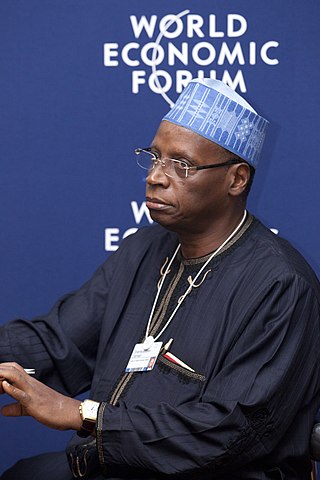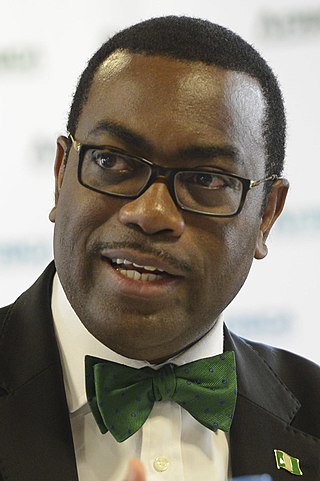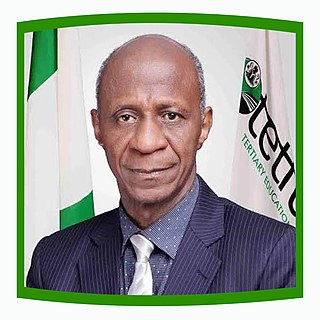
Kano is a city in northern Nigeria and the capital of Kano State. It is the second largest city in Nigeria after Lagos, with over ten million citizens living within 449 km2 (173 sq mi). Located in the savanna, south of the Sahel, Kano is a major route of the trans-Saharan trade, having been a trade and human settlement for millennia. It is the traditional state of the Dabo dynasty who have ruled as emirs over the city-state since the 19th century. Kano Emirate Council is the current traditional institution inside the city boundaries of Kano, and under the authority of the Government of Kano State.

Sokoto is a major city located in extreme north-western Nigeria, near the confluence of the Sokoto River and the Rima River. As of 2006, it has a population of over 427,760. Sokoto is the modern-day capital of Sokoto State and was previously the capital of the north-western states. Modern Sokoto is known for trading sheepskins, cattle hides, leather crafts, kola nuts and goatskins.

Katsina, likely from "Tamashek" or mazza (men) with "inna" (mother) is a Local Government Area and the capital city of Katsina State, in northern Nigeria.

The International Crops Research Institute for the Semi-Arid Tropics (ICRISAT) is an international organisation which conducts agricultural research for rural development, headquartered in Patancheru, Hyderabad, Telangana, India, with several regional centres and research stations . It was founded in 1972 by a consortium of organisations convened by the Ford- and the Rockefeller- foundations. Its charter was signed by the FAO and the UNDP.
Macrotyloma geocarpum is also known as the ground bean, geocarpa groundnut, Hausa groundnut, or Kersting's groundnut. In French, it is often called la lentille de terre. M. geocarpum is an herbaceous annual plant and a crop of minor economic importance in sub-Saharan Africa, tolerant of drought, with a growth habit similar to that of the peanut.

Kano State is one of the 36 states of Nigeria, located in the northern region of the country. According to the national census done in 2006, Kano State is the most populous state in Nigeria. The recent official estimates taken in 2016 by the National Bureau of Statistics found that Kano State was still the largest state by population in Nigeria. Created in 1967 out of the former Northern Region, Kano State borders on Katsina State to the northwest for about 210 km, Jigawa State to the northeast for 355 km, Bauchi State to the southeast for 131 km, and Kaduna State to the southwest for 255 km. The state's capital and largest city is the city of Kano, the second most populous city in Nigeria after Lagos. The incumbent governor of the state is Abba Kabir Yusuf. He was sworn in on 29 May 2023.
Ibrahim Shekarau is a former Nigerian minister of education and two-term Governor of Kano State in Nigeria. He was elected in April 2003 and re-elected in April 2007. He is a member of the Peoples Democratic Party (PDP). He was one of the candidates who aspired to become president in the Nigerian general elections of 2011.

Agriculture is a major sector of the Nigerian economy, accounting for up to 35% of total employment in 2020. According to the FAO, agriculture remains the foundation of the Nigerian economy, providing livelihood for most Nigerians and generating millions of jobs. Along with crude oil, Nigeria relies on the agricultural products it exports to generate most of its national revenue. The agricultural sector in Nigeria comprises four sub-sectors: crop production, livestock, forestry, and fishing.

Aliko Dangote is a Nigerian businessman and industrialist. He is best known as the founder, chairman, and CEO of the Dangote Group, the largest industrial conglomerate in West Africa. The Bloomberg Billionaires Index estimated his net worth at $15.3 billion in May 2024, making him the richest person in Africa, the world's richest black person, and the world's 132nd richest person overall.
Sanusi Dantata was a wealthy Nigerian entrepreneur and son of Alhassan Dantata. He was a director of the Nigeria branch of Shell B.P. and founder of Sanusi Dantata and sons limited.
Alhassan Dantata ; Arabic: ال حسان دان تاتا, romanized: al-Ḥasan ɗan Tātā; 1877 – 17 August 1955) was a Nigerian businessman and philanthropist. Through his trade with large British companies, he became one of the wealthiest men in West Africa during his time. He is the great-grandfather of Aliko Dangote, the wealthiest person in Nigeria and Africa.
Dala is a densely populated Local Government Area in Kano State, Nigeria within Kano city created in May, 1989 from the old Kano Municipal Local Government. It is located in the north-west part of the Kano metropolis. Its headquarter is in Gwammaja.

Shamsuddeen Usman,, is a Nigerian economist, banker, technocrat and public servant. He is currently the CEO of SUSMAN & Associates, an economic, financial and management consulting firm headquartered in Nigeria. He was the Finance Minister of Nigeria between June 2007 and January 2009 and also served as the Minister of National Planning from January 2009 to September 2013. Usman is the Chairman of Citibank Nigeria Limited.
Danja is a Local Government Area in Katsina State, Nigeria. Its headquarters is located in the town of Danja.

The Kano Emirate Council is a traditional state in Northern Nigeria with headquarters in the city of Kano, the capital of the modern Kano State. Preceded by the Emirate of Kano, the council was formed in 1903 after the British pacification of the Sokoto Caliphate. The borders of the Emirate are contiguous with Kano State.

Akinwumi "Akin" AdesinaCON is a Nigerian economist, who is currently serving as the President of the African Development Bank. He previously served as Nigeria's Minister of Agriculture and Rural Development. Until his appointment as Minister in 2010, he was Vice President of Policy and Partnerships for the Alliance for a Green Revolution in Africa (AGRA). He was elected as the President of the African Development Bank in 2015 and re-elected for a second term in 2020. He is the first Nigerian to hold the post.
Tamburawa is a prominent town in Dawakin Kudu Local Government located fifteen (15 km) kilometres from Kano City in Kano State, Nigeria. The inhabitant of Tamburawa are Hausa, mostly lecturers, farmers, union workers, and businessmen. Irrigation farming is widely practiced. Tamburawa which is also known as Tamburawa Yamma, is a unique and homogeneous town. In the 2006 population census, Tamburawa and its remote villages were marked with a number of approximately 13,453 inhabitants. It is also divided into four major zones i.e. Kofar Arewa, Kofar Gabas, Kofar Yamma, and lastly Kofar Kudu. The people of Tamburawa have great enthusiasm for the game of football. It has a particular team that normally stands for the town in competitions or leagues that is Tamburawa United. The geographical location of Tamburawa is 11,52W 17,50E and 8,32 15.55E. standing 1450 ft above sea level. Tamburawa people of course practice child marriage in the community although they are said to be doing it according to the Shariah Law. Tamburawa is the centre of a prosperous, densely populated, agricultural region in which millet, rice, peanuts, and beans are produced. It is an important market centre for peanuts, livestock, grains, and other foodstuffs from the surrounding area. The people of Tamburawa are mostly followers of one religion, which is Islam. About 99.9% of the people are Muslims.

Aminu Dantata ; born 19 May 1931) is a Nigerian businessman and philanthropist who is one of the promoters of Kano State Foundation, an endowment fund that supported educational initiatives and provided grants to small-scale entrepreneurs in Kano. He is the head of a group of companies that manages his real estate and other business ventures.
Tudun Wada is a local government area in Kano State. The postal code is 710104.

Suleiman Elias Bogoro is a professor of Animal Science, specializing in Biochemistry and Ruminant Nutrition, who served as the 5th and 8th Executive Secretary of Tertiary Education Trust Fund in Nigeria.












